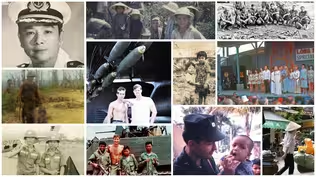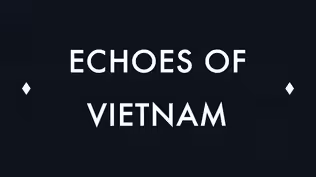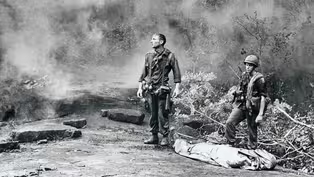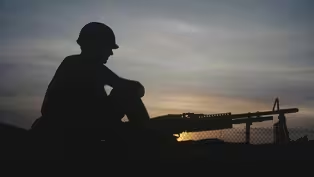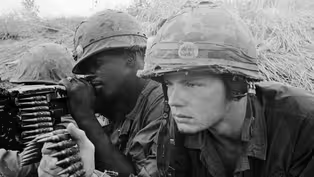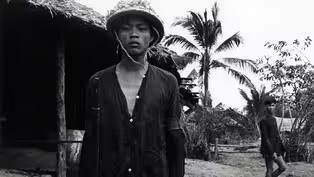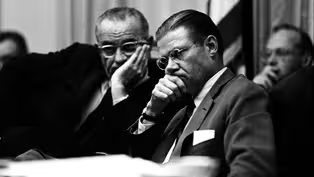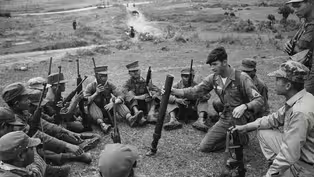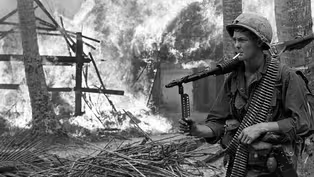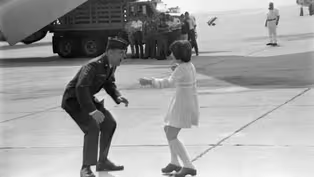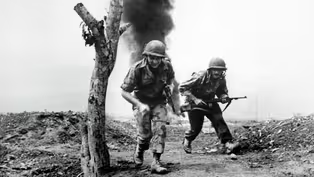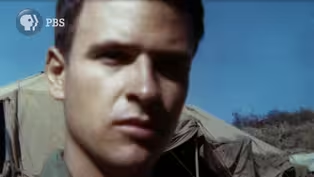
The History of the World (April 1969-May 1970)
Episode 8 | 1h 52m 9sVideo has Audio Description
Nixon withdraws troops but upon sending forces to Cambodia the antiwar movement reignites.
With morale plummeting in Vietnam, President Nixon begins withdrawing American troops. As news breaks of an unthinkable massacre committed by American soldiers, the public debates the rectitude of the war, while an incursion into Cambodia reignites antiwar protests with tragic consequences.
See all videos with Audio DescriptionADProblems playing video? | Closed Captioning Feedback
Problems playing video? | Closed Captioning Feedback
Funding for The Vietnam War is provided by Bank of America; Corporation for Public Broadcasting; David H. Koch; The Blavatnik Family Foundation; Park Foundation; The Arthur Vining Davis Foundations; The...

The History of the World (April 1969-May 1970)
Episode 8 | 1h 52m 9sVideo has Audio Description
With morale plummeting in Vietnam, President Nixon begins withdrawing American troops. As news breaks of an unthinkable massacre committed by American soldiers, the public debates the rectitude of the war, while an incursion into Cambodia reignites antiwar protests with tragic consequences.
See all videos with Audio DescriptionADProblems playing video? | Closed Captioning Feedback
How to Watch The Vietnam War
The Vietnam War is available to stream on pbs.org and the free PBS App, available on iPhone, Apple TV, Android TV, Android smartphones, Amazon Fire TV, Amazon Fire Tablet, Roku, Samsung Smart TV, and Vizio.
Buy Now
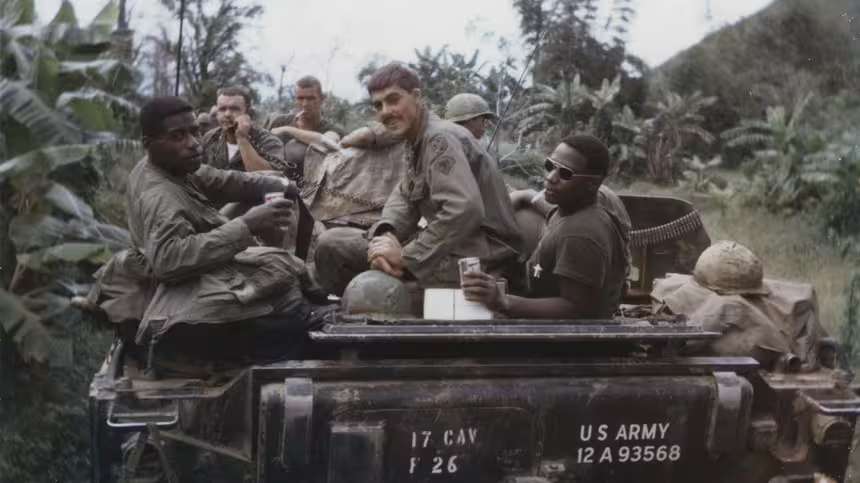
Vietnam Stories
We asked viewers to share their experiences during the events of the Vietnam War era. The response was thousands of videos, photographs, and short stories.Providing Support for PBS.org
Learn Moreabout PBS online sponsorshipMore from This Collection
These episodes feature audio tracks containing English, Spanish and Descriptive Audio.
The Weight of Memory (March 1973-Onward)
Video has Audio Description
Saigon falls and the war ends. Americans & Vietnamese from all sides seek reconciliation. (1h 50m 56s)
The Veneer of Civilization (June 1968-May 1969)
Video has Audio Description
After chaos roils the Democratic Convention, Nixon, promising peace, wins the presidency. (1h 50m 54s)
This Is What We Do (July 1967-December 1967)
Video has Audio Description
President Johnson escalates the war while promising the public that victory is in sight. (1h 28m 17s)
Things Fall Apart (January 1968-July 1968)
Video has Audio Description
Shaken by the Tet Offensive, assassinations and unrest, America seems to be coming apart. (1h 27m 46s)
The River Styx (January 1964-December 1965)
Video has Audio Description
With South Vietnam near collapse, LBJ bombs the North and sends US troops to the South. (1h 57m 55s)
Video has Audio Description
As a communist insurgency gains strength, JFK wrestles with US involvement in Vietnam. (1h 26m 27s)
Resolve (January 1966-June 1967)
Video has Audio Description
US soldiers discover Vietnam is unlike their fathers’ war, as the antiwar movement grows. (1h 57m 25s)
A Disrespectful Loyalty (May 1970-March 1973)
Video has Audio Description
South Vietnam fights alone as Nixon and Kissinger find a way out for America. POWs return. (1h 52m 32s)
Video has Audio Description
After a century of French occupation, Vietnam emerges independent but divided. (1h 25m 20s)
Providing Support for PBS.org
Learn Moreabout PBS online sponsorshipANNOUNCER: MAJOR SUPPORT FOR "THE VIETNAM WAR" WAS PROVIDED BY MEMBERS OF THE BETTER ANGELS SOCIETY, INCLUDING JONATHAN AND JEANNIE LAVINE, DIANE AND HAL BRIERLEY, AMY AND DAVID ABRAMS, JOHN AND CATHERINE DEBS, THE FULLERTON FAMILY CHARITABLE FUND, THE MONTRONE FAMILY, LYNDA AND STEWART RESNICK, THE PERRY AND DONNA GOLKIN FAMILY FOUNDATION, THE LYNCH FOUNDATION, THE ROGER AND ROSEMARY ENRICO FOUNDATION, AND BY THESE ADDITIONAL FUNDERS.
MAJOR FUNDING WAS ALSO PROVIDED BY DAVID H. KOCH...
THE BLAVATNIK FAMILY FOUNDATION...
THE PARK FOUNDATION, THE NATIONAL ENDOWMENT FOR THE HUMANITIES, THE PEW CHARITABLE TRUSTS, THE JOHN S. AND JAMES L. KNIGHT FOUNDATION, THE ANDREW W. MELLON FOUNDATION, THE ARTHUR VINING DAVIS FOUNDATIONS, THE FORD FOUNDATION JUSTFILMS, BY THE CORPORATION FOR PUBLIC BROADCASTING, AND BY VIEWERS LIKE YOU.
THANK YOU.
Announcer: Can looking back push us forward?
Man: Ladies and gentlemen, Miss Billie Holiday.
♪ Will our voice be heard through time?
Can our past inspire our future?
...act of concern... ♪ Bank of America supports filmmakers like Ken Burns, whose narratives illuminate new perspectives.
What would you like the power to do?
Bank of America.
♪ ♪ ...you got through!
Did you pass Chee on the road?
No.
Where are the children?
Kansas found a shelter for them.
Get down, everybody!
JOAN FUREY: My older sister and I one time, uh, we're watching the movie So Proudly We Hail on TV.
Listen, we still have a few minutes!
FUREY: That's a story about the nurses who were trapped on Bataan and Corregidor during World War II.
(explosion) It was the first, probably, time in my life that...
I, uh...
I realized that women could do brave and courageous things.
It wasn't just something men could do.
(helicopter blades whirring) ♪ ♪ NARRATOR: Second Lieutenant Joan Furey had wanted to be a nurse ever since she was a small child.
She attended nursing school, and, when a high school classmate was killed during Tet, joined the Army to do what she could for the wounded.
Furey was assigned to the 71st Evacuation Hospital at Pleiku, in the heart of the Central Highlands.
Nothing had prepared her for what she saw and did over the next 12 months.
(indistinct chatter) (grunts) Wounded men were choppered in at all times of the day and night.
So were Viet Cong and NVA soldiers, who sometimes spat at the medical personnel trying to save their limbs or lives.
(explosions) Whenever the hospital came under mortar fire, Furey stayed with the most seriously wounded men in the ICU.
(distant explosions) We had flak vests and helmets, and we crawled around on the floor.
(explosion, clattering, men shouting) I mean, you really, you just could not leave them unattended.
(explosion) We just kind of had to swallow your own fear.
NARRATOR: A triage officer made the grim decisions as to who might be saved and those for whom there was no hope.
FUREY: One of the things that initially was so difficult was what we called "expected" patients.
And these were patients that would be brought in from the battlefield and it was determined they had no chance to survive.
But they weren't dead yet.
They brought in a... a young soldier who had a head injury, and they said, "He's expected."
I kind of freaked out, uh, and I decided that, no, they were wrong, and I was gonna take care of this patient.
I told the corpsman to get me blood.
And he's saying, "Well, Lieutenant, the patient is expected."
I said, "Get me blood."
So, I take off the dressing, and... the whole back of his head had been gone.
When that happened, all the blood I had been giving him came out.
A friend of mine who came over just walked me out of there.
And a few minutes later, you walk right back in... ...and you get back to doing it.
(amplified heartbeat) ("Dazed and Confused" by Led Zeppelin playing) ♪ Been dazed and confused ♪ ♪ For so long, it's not true... ♪ NARRATOR: Richard Nixon had taken office as president in January of 1969, pledged to restore law and order and end the war with honor.
(gunfire) Things were calmer at home, but in Vietnam, peace was no closer.
("Dazed and Confused" continues) American soldiers still died pursuing guerrillas who appeared and disappeared like phantoms.
Americans still died capturing hills only to give them up and have to take them back again.
Men and materiel were still flowing into the south despite the controversial bombing of Cambodia.
Through it all, Hanoi remained immovable.
The communists insisted there could be no peace until the Saigon government was replaced and the United States withdrew from Vietnam.
Meanwhile, the American public was losing patience.
♪ ♪ (men shouting) (gunfire fades) Privately, Nixon knew that military victory was impossible, that things would have to be settled at the bargaining table in Paris.
He had to find a way to extricate Americans from Vietnam without seeming to surrender.
Nixon also believed his reputation as an implacable anti-communist could work to his advantage with Hanoi.
"We'll just slip the word to them," he said, "you know, 'Nixon's obsessed about communism.
"'We can't restrain him when he's angry, "and he has his hand on the nuclear button,' "and Ho Chi Minh will be in Paris in two days begging for peace."
But Ho Chi Minh was old and ailing now.
And Le Duan and the other men who had been calling the shots in Hanoi for years had no intention of giving up their goal of uniting their country under communist control.
("While My Guitar Gently Weeps" by the Beatles playing) Richard Nixon, having promised a swift end to the war, would, like all the presidents who came before him, end up widening it.
In the process, he would re-ignite opposition to the war on American campuses that threatened to tear the country apart again.
♪ I look at you all ♪ ♪ See the love there that's sleeping ♪ (crowd clamoring) ♪ While my guitar ♪ ♪ Gently weeps ♪ ♪ I look at the floor... ♪ MERRILL McPEAK: The late '60s were a kind of confluence of several rivulets.
BEATLES: ♪ Still my guitar... ♪ McPEAK: There was the antiwar movement itself... ♪ ♪ ...the whole movement towards racial equality, the environment... the role of women.
And the anthems for that counterculture were provided by the most brilliant rock-and-roll music that you can imagine.
BEATLES: ♪ And I notice... ♪ I don't know how we could exist today as a country without that experience.
With all of its warts and ups and downs, that produced the America we have today, and we are better for it.
(gunfire) ♪ Surely be learning... ♪ McPEAK: And I felt that way in Vietnam.
♪ Still my guitar... ♪ McPEAK: I turned the volume up on all that stuff.
That represented what I was trying to defend.
♪ ♪ (gunfire, artillery fire, shouting) (explosion) ♪ Oh, oh ♪ (fading): ♪ Ooh, ooh, oh, oh... ♪ HAL KUSHNER: I never prayed the whole time I was in the P.O.W.
camp, but I had, like, a mantra.
Every night when I went to sleep, after a certain point, I would say, "I'll be here when the morning comes."
And I felt if I could just live one more day, then I could live one more day, and then one more day.
NARRATOR: At the peace talks in Paris, the Nixon administration had introduced a new demand-- U.S. troops would not withdraw until all American prisoners had come home and Hanoi had provided a strict accounting of those missing in action.
No one knew how many prisoners there were.
Most were airmen held in or around Hanoi, but a handful of others, like Hal Kushner, were struggling to survive in makeshift jungle camps in South Vietnam.
Hanoi would not reveal the names of the men they held, because they still insisted they were not prisoners of war, but war criminals.
They subjected many to brutal torture, extracted "confessions," and refused to permit inspections by the International Red Cross.
The Johnson administration had generally downplayed the issue, hoping quiet diplomacy might bring the men home.
The Nixon administration launched a "go public" campaign instead, meant to put the plight of American prisoners and those missing in action at the center of things.
It also provided a rebuke to those in the antiwar movement who seemed more sympathetic to North Vietnamese civilians who had been bombed than they were to U.S. airmen who had been shot down doing that bombing.
Sybil Stockdale, whose husband, Commander James Stockdale, was the highest-ranking prisoner in Hanoi, formed the National League of Families of Prisoners and Missing in Southeast Asia, and led delegations of wives to Paris to confront North Vietnamese negotiators.
Five million Americans began wearing tin or copper bracelets engraved with a missing man's name and date of loss.
More than 50 million P.O.W./M.I.A.
bumper stickers would be sold over the next four years.
Despite what their jailers had told them, the prisoners had not been forgotten by their country.
Eventually, one journalist wrote, many "people began to speak "as though the North Vietnamese had kidnapped 400 Americans and the United States had gone to war to retrieve them."
At the same time, the Saigon government of Nguyen Van Thieu was holding prisoners of its own.
There would eventually be some 40,000 North Vietnamese and Viet Cong soldiers in four crowded camps.
Another 200,000 South Vietnamese civilians would also be held, many without trial.
NGUYEN TAI: JAMES GILLAM: There are certain rules to tunnel warfare.
Don't turn on the light unless you're really, really, really sure you're alone.
Use your senses.
Do your first killing as quietly as you can.
That means don't shoot.
I chased somebody into a tunnel, met them at a bend in the corner, in the dark.
I thought I was alone and then I smelled their breath.
And we had a wrestling match in the dark.
And I got the upper hand and crushed this person's trachea, held him down while he died... ...and then got out.
I beat and strangled someone to death in a tunnel in the dark.
Um...
But that wasn't the only casualty.
The other casualty was the civilized version of me.
(gunfire) (gunfire continuing) (shouting) NARRATOR: April 1969 marked the high point of American military commitment to South Vietnam.
543,482 men and women were now in country, and tens of thousands more were stationed at airbases and aboard ships beyond its borders.
40,794 had died.
And more than $70 billion had been spent.
(explosion in distance) That spring, a new battle caught the attention of the American public, a struggle to take still another numbered hill-- Hill 937 on military maps.
CHET HUNTLEY: For nine days, American and South Vietnamese troops have been trying to take a mountain near the Laotian border, and ten times they have been thrown back.
(booming, shouting) (gunfire) (shouting over radio) The casualties have been so high-- 50 Americans and 250 North Vietnamese killed-- that the mountain has come to be known as "Hamburger Hill."
Today, another 600 allied troops were thrown into the battle.
(helicopter blades whirring) (gunfire) (explosion, screaming) NARRATOR: A weary G.I.
told a reporter that his battalion commander "won't stop until he kills every damn one of us."
(explosion, gunfire) After 11 days of fighting, the Battle for Hamburger Hill ended.
56 Americans died.
420 more were wounded.
A week later, the Americans abandoned the hill, just as they had abandoned so many other hills they had taken at great cost over the years in Vietnam.
General, could you explain for us again the strategy involved in the decision to withdraw American troops after they had taken Hill 937, or Hamburger Hill?
No piece of ground, as such, is important to us.
HUNTLEY: In the United States Senate, Senator Kennedy of Massachusetts delivered a brief speech criticizing what he called a "senseless and irresponsible military pride "in which American men are sent to their deaths in pointless battles like this one for Hamburger Hill."
Kennedy called upon President Nixon to issue new orders to commanders in Vietnam to halt such actions and he charged that they contradict the president's stated intentions of seeking a negotiated peace.
NARRATOR: There had been more deadly weeks during the war, costlier battles, larger numbers of casualties.
But more and more Americans seemed to have had enough.
The following month, Life magazine published the names and photographs of all 242 Americans who had died in combat in just one week.
For the first time, in a national publication, casualty statistics came with human faces.
The only way they could measure success in Vietnam was, was was kill ratios-- how many of them versus how many of us.
Well, the only thing that's important to the American people is the "us."
You know, if there's three us dead, that's the number.
Not 30, you know, Vietnamese dead.
And, so, politically, an attrition strategy just can't last very long.
We don't care what the ratio is, we just want the absolute number of how many American kids died.
NARRATOR: A Gallup poll now found that most Americans believed Vietnam had been a mistake.
Richard Nixon knew he needed to signal to the public that an end was in sight.
The National Security Council had warned Nixon that the Joint Chiefs of Staff, the secretaries of state and defense, the C.I.A., and the U.S. Embassy in Saigon all privately agreed that without U.S. combat troops, the South Vietnamese "cannot now, or in the foreseeable future, "stand up to both Viet Cong and sizeable North Vietnamese forces."
Nonetheless, Secretary of Defense Melvin Laird said, the war was now to be "Vietnamized."
Saigon's troops would gradually take over responsibility for engaging the enemy.
It would be General Creighton Abrams' task to ready the ARVN for that role, and to make sure that American casualties were held down in the interim.
("The Letter" by The Box Tops starts playing) Meanwhile, American troops would start to go home.
♪ Gimme a ticket for an aeroplane ♪ ♪ Ain't got time to take a fast train ♪ DUONG VAN MAI ELLIOTT: When Nixon came in and he announced the phase withdrawal, turning over the fighting to the Vietnamese, which was something the French had tried before.
They call it jaunissement-- yellowizing the war.
We knew that the Vietnamese Army was not up to fighting this war.
If they couldn't do it with the Americans, how were they going to do it without the Americans?
♪ Lonely days are gone ♪ NARRATOR: Although Washington planned to vastly increase military support of the South Vietnamese Army, General Abrams knew that Vietnamization alone could never defeat the enemy.
But he had his orders.
McPEAK: The reason I was ordered home early was because Nixon... President Nixon announced the policy of Vietnamization.
Now, Vietnamization was a lie, but it had an element of truth in it.
We were leaving, okay?
And that sealed the South's fate.
I knew it.
And I think anybody who was conscious and could see what was going on knew it.
NARRATOR: Nixon then flew to Midway Island to meet with South Vietnamese President Nguyen Van Thieu.
He had not dared invite Thieu to Washington for fear of sparking mass demonstrations.
♪ Lonely days are gone ♪ President Thieu informed me that the progress of the training program and the equipping program for South Vietnamese forces had been so successful, uh, that he could now recommend that the United States begin to replace U.S. combat forces with Vietnamese forces.
(speaking Vietnamese) NARRATOR: Thieu had said no such thing but felt he had to go along.
"There is nothing I can do," he told a friend.
"Just as we could do nothing about it "when Eisenhower, Kennedy, and Johnson decided to come in."
"We were clearly on the way out of Vietnam," National Security Advisor Henry Kissinger remembered, "by negotiation if possible, by unilateral withdrawal if necessary."
He and the president were redefining what victory would look like.
TOM VALLELY: Nixon and Kissinger...
They... Their job is to clean up.
They're, they're...
The war's over, okay?
When Nixon and Kissinger, when they come, they're... they're not gonna win the war.
("Taps" playing) So they develop a secret strategy.
They surrender without saying they surrendered.
This is not a bad strategy, this is the only strategy.
("Circle for a Landing" by Three Dog Night starts playing) (indistinct announcement over P.A.)
NARRATOR: As American soldiers began leaving South Vietnam, American weaponry and materiel poured in.
♪ Circle for a landing ♪ ♪ Get your feet back on the ground ♪ More than a million M16 rifles, 40,000 grenade launchers, thousands of wheeled vehicles-- so many, one congressman complained, that it seemed as if the United States taxpayer was being asked to "put every South Vietnamese soldier behind the wheel."
NEIL SHEEHAN: It didn't make any sense, of course, because we tried that in 1962 and '63.
The people hadn't changed.
They were just giving 'em more furniture.
NGUYEN THOI BUNG: NARRATOR: South Vietnamese armed forces were expanded from 850,000 men to over a million.
But nothing could alter the fact that rampant corruption continually eroded their effectiveness.
DON WEBSTER: The way it works is this: a man makes a deal with his commanding officer, perhaps to pay the officer his full salary.
In exchange, you never have to show up for duty, except perhaps once a week at the ceremony.
So while you're theoretically in the Army, you can hold a full-time civilian job.
LAM QUANG THI: (gunfire) NARRATOR: Many ARVN units did fight well.
They had borne the brunt of the fighting during the Tet Offensive, and, by the middle of 1969, 90,000 of them had been killed in combat.
Their bravery was often overlooked by Americans.
VALLELY: We were disdainful of them.
We overstated their incompetence because we wanted to overstate our importance.
(booming in distance) (men shouting, gunfire) Part of going to war in Vietnam I, I enjoyed.
If you survive it, it's, it's quite thrilling.
It's the history of the world.
It's hard to survive.
I mean, in, where I was, survival is an issue.
I would have loved to have been in the National Guard.
Period.
("Bad Moon Rising" by Creedence Clearwater Revival playing) I knew the core issue of what was acceptable in war and what wasn't.
I knew that.
I didn't need to get that from the Marine Corps.
I got that from Sunday school.
NARRATOR: Thomas John Vallely was born in Boston, the son of a judge, and brought up in the suburb of Newton.
Undiagnosed dyslexia kept him from doing well in school.
By 1969, Vallely was a radio operator in the Marine Corps, part of a massive search-and-destroy mission in Quang Nam Province in the northern part of South Vietnam.
(men shouting, gunfire) On August 13, his company was ambushed and came under heavy machine gun fire.
(gunfire) VALLELY: It was a "grab 'em by the belt" type of situation.
And we lost a lot of people.
So did they.
Lot of people laying around.
(gunfire, explosion) NARRATOR: Vallely radioed for reinforcements.
Then he picked up a rifle and ammunition from a wounded Marine, and, firing as he went, took up a position just ten feet from an enemy machine gun.
He hurled a smoke grenade to mark their position.
And then, as enemy fire swept back and forth across the field, he moved from Marine to Marine, pointing out targets among the trees and encouraging his comrades.
For his conspicuous gallantry, Tom Vallely was awarded the Silver Star.
VALLELY: You want to tell your grandchildren it has a lot to do with courage, uh, but it, it's really quite reactive.
It's survival.
Either you're...
It's, it's...
There's no choice here.
You react or you're not gonna have grandchildren.
COUNTRY JOE McDONALD: Give me an "F"!
CROWD: "F"!
McDONALD: Give me a "U"!
CROWD: "U"!
McDONALD: Give me a "..."!
"..."!
Give me a "..."!
"..."!
What's that spell?!
NARRATOR: Two days after the battle in which Tom Vallely distinguished himself, and while half a million Americans were still in Vietnam, half a million Americans gathered on a dairy farm in upstate New York for a music festival: Woodstock.
♪ Way down yonder in Vietnam ♪ ♪ Put down your books and pick up a gun ♪ ♪ We're gonna have a whole lot of fun ♪ ♪ And it's one, two, three, what are we fighting for?
♪ ♪ Don't ask me, I don't give a damn ♪ ♪ The next stop is Vietnam ♪ ♪ And it's five, six, seven ♪ ♪ Open up the pearly gates ♪ ♪ Well, there ain't no time to wonder why, whoopee ♪ ♪ We're all gonna die ♪ ("Soul Sacrifice" by Santana playing) ♪ ♪ (song ends, crowd cheering) MAN: Ladies and gentlemen, Santana!
You've been told once, you've been told twice.
That's all-- spread it out!
("Time of the Season" by the Zombies playing) ♪ What's your name?
♪ GILLAM: This guy from Arkansas told me he would not carry the radio for me.
He said, "I will not follow you like Cheetah follows Tarzan.
It's not gonna happen, Sarge."
And I thought, "Oh, this is gonna be a really long year."
I've got people down there sweeping, so get 'em down there.
♪ It's the time ♪ GILLAM: He evolved a little bit.
You know, he, he kind of got the idea that the enemy's bullets are colorblind.
They would shoot anybody, not just me.
NARRATOR: African-Americans had served in every American war since the revolution.
In the early years of the Vietnam War, they suffered a disproportionate number of combat deaths.
When civil rights leaders complained, the Defense Department made a concerted effort to right that balance, and by 1969, it had succeeded.
But behind the lines, African-American soldiers were still treated differently from their white counterparts.
("Respect" by Otis Redding playing) SOLDIER: And here there's all, all these beast mother... walking around here with their hair looking like goddamn girls, and we can't wear our hair mother... three inches long.
The mother... regulation is three inches.
And most of the brothers can wear a afro, the hair gonna be mother... two inches.
And why we got to get our hair cut?
That's what I want to know.
♪ Yeah, man, ooh, yeah ♪ WAYNE SMITH: Vietnam was a microcosm.
Everything that was happening in America was happening in Vietnam, really, in one way, shape, or form.
In the rear, there were Confederate flags flying.
SOLDIER 2: I mean, of all things to have over here, man, why a Confederate flag?
As a matter of fact, I think there ought to be some goddamn law to ... outlaw them goddamn flags, man.
The ... Confederacy is gone, man.
SMITH: When one is in an environment where everyone has a gun, automatic weapon, I'll be goddamned if someone's gonna call me a nigger or give me a bull... order.
I mean, that was the attitude, to risk my life for what?
REDDING: ♪ Sweeter than honey ♪ ROGER HARRIS: There was all kind of craziness happening, because white people were still calling, you know, us niggers, and then there were some black people calling us Uncle Toms.
There were the antiwar folks who were calling us baby killers, say... You know, you can say what you want, but you can say it from over there because if you get in range, you're gonna get serious damage done to you.
Say what you want from a distance, but if you get close to me, I'm gonna rip your throat out.
You know?
JUAN RAMIREZ: But when we walked outside that wire, we went out into the bush, we were tight.
Even with our differences.
Maybe we had threatened each other, we'd had a fight back in the base, but when we were out there, you know, we, we were a, a fighting unit.
And it's almost like an identity crisis.
I was born here, and my parents were born here.
I felt, in a way, more American than Mexican.
MAN: ...hand and repeat after me... NARRATOR: The U.S. military did not officially count Hispanics, but an estimated 170,000 would serve in Vietnam and more than 3,000 lost their lives.
Like their fathers and grandfathers, many saw military service as both a patriotic duty and an opportunity to advance their standing in the United States.
But as casualties mounted and with a burgeoning Chicano identity movement among farm workers and college students, anti-war sentiment in Hispanic communities grew.
We're protesting against the discriminatory draft laws that give deferments to all the Anglo middle-class people of this country and make the heaviest burdens of the war fall on the poor, fall on the Mexicano.
RAMIREZ: I had learned about my sister and my mother's antiwar activities while I was still in Vietnam.
In fact, my sister wrote and said, "I hope you're okay with this."
And she was honest with me.
She told me what they were doing.
She says, "I'm doing it for you, 'cause I want you to come home."
(indistinct chanting) (TV clicks on) In line with our policy of taking a stand on the pressing issues of the day, we now present another in our continuing series of editorials.
The subject: are our draft laws unfair?
Here again, speaking for our program, is Mr. Patrick Paulsen, vice president.
(applause) Now, we don't claim the draft is perfect, and we do have a constructive proposal for a workable alternative.
We propose a draft lottery in which the names of all eligible males will be put into a hat, and the men will be drafted according to their head sizes.
The tiny heads will go into the military service and the fat heads will go into government.
SOLDIER (on radio): Roger, 3-1 is on his way.
SOLDIER (over radio): 5-8-1.
VINCENT OKAMOTO: A 19-year-old high school dropout says, "Why are we here?"
And the, the standard response, at least on an official level, was, to prevent international communism from conquering the world.
The men say, "Hey, that, that's bull..." So the other reason put forth, at least in the latter days of the war, was to maintain America's international credibility with our allies, and our enemies.
Uh, no 19, 20-year-old kid wants to die to maintain the credibility of Lyndon Johnson or Richard Nixon.
And so, within a relatively short time, the guys were saying, "Look, we shouldn't be here, but we are.
"So my only function in life "is to try and keep you alive, buddy, "and to keep my precious ass from being killed.
And then to go home and forget about this."
SOLDIER: The grunts, uh, don't always do what the captain says, you know.
We got, uh-- the captain will stay back, he'll tell the platoon or something to go out so many hundred meters, you know.
We don't do it.
We only go as far as we get out of sight, sit down, and come back in.
JOHN PILGER: What happens to an unpopular officer out in the field?
Mostly unpopular officers, from what I've heard, if they, if they mess with a grunt too much, they get shot at.
NARRATOR: It had always been a part of war.
In Vietnam, it was called "fragging," after the fragmentation grenades most often used.
Beginning in the summer of 1969, as thousands of American troops began going home, the number of reports of the murder or attempted murder by enlisted men of their superiors increased alarmingly.
The Army would investigate nearly 800 cases.
Most took place far from the fighting, usually the violent outcome of arguments over race or women or drugs rather than the war itself.
But there were exceptions.
OKAMOTO: It's a totally different army than what we sent to Vietnam in 1965.
And the new lieutenant comes in, all gung-ho for body count.
He wants contact, he goes crazy, and says, "I want a volunteer for this."
(rapid gunfire) That new gung-ho officer was a clear and present danger to the life and limb of the grunts.
They'd have subtle hints, like a little note saying, "We're gonna kill your ass if you keep this up."
Or instead of a fragmentation grenade, they may throw a smoke grenade in an officer's hooch or bunker.
And if they didn't correct their behavior and outlook, yeah, they would frag them.
I saw it happen in a very, uh, strange way.
We were in a base and a Marine started running towards me.
I didn't realize that what he... what he was doing back in the dark over there was actually throw a hand grenade underneath the space that is underneath a hooch.
(explosion) And when it exploded, I went, "Holy ..." And I knew right away what he had done.
And he was an African-American Marine.
African-Americans were treated with disrespect by their superiors.
This was not uncommon.
So in a ways, as bad as this sounds, maybe that guy had it coming to him.
I don't know.
In Paris, the 29th session of the so-called peace talks took place.
There was no progress.
In Vietnam, it was announced that 139 Americans lost their lives last week, bringing total deaths in our longest war... NARRATOR: The four-way peace talks in Paris continued to go nowhere.
To break the logjam, Nixon directed Henry Kissinger to begin secret talks, the first in a series of clandestine meetings with the North Vietnamese alone.
They first met in an apartment building on the Rue de Rivoli.
The Viet Cong and the South Vietnamese government were not included.
Hanoi remained immovable.
They would not even admit they had troops in South Vietnam, let alone discuss withdrawing them.
Now Kissinger warned that if there were no change in their position by November 1, the one-year anniversary of President Johnson's bombing halt, President Nixon would "consider steps of grave consequence."
September 2, 1969, was the 24th anniversary of Ho Chi Minh's declaration of Vietnamese independence in Hanoi's Ba Dinh Square.
At 9:45 that morning, Ho died.
He was said to be 79, but like so much about him, the precise date of his birth was shrouded in mystery.
He had been "Uncle Ho" for decades, the living embodiment of the struggle against the Japanese, the French, the Saigon government, and then the Americans.
♪ ♪ In a speech to the National Assembly, Le Duan, the First Secretary of the Communist Party, who had been the architect of North Vietnamese military policy for a decade, promised to fulfill what he said was Ho's vision: the reunification of the country on communist terms.
Nothing had changed.
ROBERT FRISHMAN: Hanoi has given the false impression that all is wine and roses and it isn't so.
NARRATOR: The same day Ho Chi Minh died, an unusual press conference was held at the Bethesda Naval Medical Center.
Two ailing prisoners of war, Robert Frishman and Douglas Hegdahl, who had recently been released by the North Vietnamese, spoke in public for the first time about the severe treatment they and their fellow prisoners had received.
I don't think solitary confinement, forced statements, living in a cage for three years, being put in straps, not being allowed to sleep or eat, removal of fingernails, being hung from a ceiling, having an infected arm which was almost lost, not receiving medical care, being dragged along the ground with a broken leg, or not allowing exchange of mail to prisoners of war are humane.
NARRATOR: Douglas Hegdahl was quiet, self-effacing, and so apparently clueless, his North Vietnamese guards had called him the "stupid one."
But once released, he was a gold mine of information.
He had memorized the names of more than 200 prisoners to the tune of "Old McDonald Had a Farm."
Thanks to him, scores of American families would find out for the first time that their sons and husbands and fathers were still alive.
Within a few days of the press conference, Hanoi's treatment of the prisoners began to improve.
"A lot less brutality," one captive remembered, "and larger bowls of rice."
(explosion) (men yelling) (rapid gunfire) DEVALLIER: All right, who's wounded?
All right, give me some cover!
RICHARD THRELKELD: Devallier is the lone medic in the platoon.
He's scared, scared from the moment he gets out of the chopper to the moment it picks him up.
Scared that someday he's going to get killed picking up a wounded buddy.
(rapid gunfire, men yelling) WAYNE SMITH: I was the replacement for a medic who had been killed.
First time out, we were assigned to do a patrol.
MAN: Remember to stop the bleeding!
SMITH: And we stumbled actually into an ambush.
(explosion) And it was incredibly terrifying.
Guys were screaming and yelling.
There was shooting everywhere.
That first firefight, I remember praying to God, if He got me through this that I would make a difference.
That I really would make a difference.
MEDIC: Sometimes their lives depend on you, I mean; you hold it in your hands, as a medic.
It's just hard to say but right then, you hold life and death in your hand.
NARRATOR: In Vietnam, medics and navy corpsmen accompanied infantry units on patrols, search and destroy missions, and large-scale combat operations.
Nearly 2,000 would lose their lives.
(helicopter whirring) Unlike in previous wars, many medics in Vietnam chose to carry weapons, and when the shooting started, were willing to use them to protect themselves and their wounded comrades.
SMITH: I carried an M16, but I did not know if I could kill.
Part of being a medic was to save lives.
I wondered, if the scenario presented itself, would I?
I did participate in shooting at the enemy.
We killed a lot of people.
I feel that responsibility.
I feel blood on my hands.
When you kill someone for your country, all things change.
("Come Ye" by Nina Simone playing) ♪ Come ye ♪ ♪ Ye who would have peace... ♪ SAM BROWN: We believed it's possible to create a substantial majority in this country for withdrawal from Vietnam, and that's what we're about in the long run.
In November, we'll be back again, in December, we'll be back again.
And we intend to build the movement, which will make it imperative that the United States withdraw from Vietnam.
REPORTER: The organizers of the moratorium do not aim at confrontation or scuffles with the police.
Instead, they want to involve the most people possible in some gesture of protest, however modest, so as to show the administration that a large bloc of Americans care not about winning or losing the war, but only about ending it.
♪ Ye who have no fear ♪ Thank you.
NIXON: Now, I understand that there has been and continues to be opposition to the war in Vietnam on the campuses and also in the nation.
Uh, we expect it.
However, under no circumstances will I be affected whatever by it.
NARRATOR: Hoping to undercut support for the moratorium, Nixon canceled the draft calls for the months of November and December 1969.
And he instituted a random lottery system based on the date of a young man's birth, intended to treat rich and poor alike and do away with unfair deferments.
It was good policy and a brilliant political maneuver.
(siren wails) On the line, brothers and sisters.
On the line now.
("Subterranean Homesick Blues" by Bob Dylan playing) NARRATOR: As people across the country organized for the peaceful moratorium, members of a radical faction of the Students for a Democratic Society-- the "Weathermen"-- took more direct action.
♪ The man in a trench coat ♪ NARRATOR: Less interested in ending the war than in sparking a violent revolution, they staged what they called four "Days of Rage" in Chicago.
DYLAN: ♪ You better duck down the alleyway ♪ MAN: We no longer simply resist the pigs.
We no longer trap ourselves so that the only possible motion is in response to pig attacks.
We have gone on the offensive.
It is we who call the shots now.
NARRATOR: "Kill all the rich people," one of their leaders said.
"Break up their cars and apartments.
"Bring the revolution home.
"Kill your parents.
That's really where it's at."
MAN: Weathermen takes its name from a line in a Bob Dylan song which says, "You don't need a weatherman to know the way the wind blows."
DYLAN: ♪ Wash the plain clothes ♪ ♪ You don't need a weatherman ♪ ♪ To know which way the wind blows ♪ NARRATOR: The Weathermen assumed thousands would rally to their cause.
Only 600 did.
They blew up a statue honoring slain policemen, ran through the streets wielding chains and pipes, smashing windows and windshields and charging police barriers.
Six were shot.
250 were jailed.
75 policemen were injured; a city attorney was paralyzed for life.
(siren wails) The Black Panthers denounced the Weathermen as "anarchistic, opportunistic...
Custeristic."
BILL ZIMMERMAN: Probably 1969 was the year in which most of us were more alienated and felt more like revolutionaries.
And it led to a lot of crazy responses.
I wanted the country to undergo a radical transformation, a redistribution of wealth and power.
But to try to bring that about through armed struggle in the United States was insane.
These were all infantile fantasies that people came to out of the frustration of not having a workable strategy for ending the war.
REPORTER: What do you think people ought to do, governor, who are genuinely opposed to the war but not in favor of the Viet Cong?
Well, I think that we have had... experiences before of people who have been opposed to wars, and I think they deal through their own representatives, and it's dealt with in government channels.
But once the killing starts, the very difficult thing then is, how do you register these protests without lending comfort and aid to the enemy, without strengthening his resistance and his will to fight and thus killing more of our men?
And most Americans in the past have always respected it.
You see, the people in this country aren't fighting a Vietnam War.
The government's fighting it.
Well, the government is, uh, the government is the people, supposedly, No.
but in this instance, it is not.
Not anymore, it's not.
No, I agree with you, it is not.
Not in this situation, it's not.
Shouldn't I let my government know that I think they're crazy?
I think they are insane, really.
This is an insane thing we're doing.
As a matter of fact, Nixon said he will not listen to us and that he will not be dictated to from the people in the streets.
The people in the streets are me.
(chanting "peace now") NARRATOR: The moratorium on October 15, held all across the country, was the largest outpouring of public dissent in American history.
("Blackbird" by the Beatles playing) ♪ Blackbird singing in the dead of night ♪ ♪ Take these broken wings and learn to fly ♪ ♪ All your life ♪ ♪ You were only waiting for this moment to arise ♪ NARRATOR: It was peaceful, middle-class, carefully focused on ending the war.
"It's nice," one marcher said, "to go to a demonstration without having to swear allegiance to Chairman Mao."
♪ All your life ♪ FRANK McGEE: Surely this is a day unique in our history.
Never have so many of our people publicly and collectively manifested opposition to this country's involvement in a war.
It is unlikely we will remain unchanged.
Hundreds and hundreds of thousands in cities from New York, with its eight million people, to Dubois, Wyoming, with its 800 people, have sought to impress upon the president their opposition to the war.
(bell rings) CAROL CROCKER: The first large protest march I went to was in Baltimore.
I'd never been with that many people at one time.
Just the energy of the crowd itself was tremendous.
I wondered if everybody was in it for the right reasons.
I wasn't there to drink or smoke pot.
Not in those situations.
These, to me, were serious business.
This was the business of living life.
This was not a party.
I didn't just want to be with the crowd.
I didn't just want to make noise.
I wanted to make a difference.
And I in no way wanted to dishonor my brother.
♪ For this moment to arrive ♪ QUINN: For most of the government today, it was business as usual.
But at noon on the Capitol steps, a thousand young congressional staff employees stood in silence for 45 minutes.
♪ Blackbird singing in the dead of night ♪ NARRATOR: The children of several of the president's closest aides and cabinet members took part in the national moratorium.
Vice President Agnew's 14-year-old daughter wanted to march, but he wouldn't let her.
Coretta Scott King, the widow of Dr. Martin Luther King, Jr., led thousands of silent demonstrators streaming past the White House, where Nixon sat alone, writing notes to himself on a yellow pad.
"Don't get rattled.
Don't waver.
Don't react."
On November 3, the president sought to seize back the initiative.
Good evening, my fellow Americans.
NARRATOR: He went on national television and called for patience and asked Americans to rally behind him.
NIXON: To you, the great silent majority of my fellow Americans, I ask for your support.
I pledged in my campaign for the presidency to end the war in a way that we could win the peace.
The more support I can have from the American people, the sooner that pledge can be redeemed; for the more divided we are at home, the less likely the enemy is to negotiate at Paris.
("Okie From Muskogee" by Merle Haggard playing) Let us be united for peace.
♪ We don't smoke marijuana in Muskogee ♪ NARRATOR: The speech was a triumph.
Nixon's approval rate soared to 68%.
MAN: All that's in the news is the fact that the moratoriums are meeting, that our country's sick... sick of this and sick of that.
It's young people are all the ones that are standing up.
And there is a silent majority, which is no longer silent.
We're the people who are wanting to show that man deserves freedom no matter where he is.
♪ A place where even squares can have a ball ♪ Many brave men died in this country to make it free...
I believe that.
and let you... and let you have everything.
SPIRO AGNEW: Senator Fulbright said some months ago that if the Vietnam War went on much longer, the best of our young people would be in Canada.
Indeed, as for these deserters, malcontents, radicals, incendiaries, the civil and the uncivil disobedience among our young, SDS, PLP, Weatherman one, Weatherman two, the Revolutionary Action Movement, Panthers, lions, hippies, yippies, tigers alike.
I'd rather swap the whole damn zoo for a single platoon of the kind of young Americans I saw in Vietnam.
(applause) NARRATOR: "We've got the liberal bastards on the run now," Nixon told his aides, "and we're going to keep them on the run."
("My Son" by Jan Howard playing) ♪ My son, my son ♪ JAN HOWARD: My doorbell rang, and it was this guy standing there, and he said, "Ms. Howard, we're marching in Memphis in protest of the Vietnam War."
I said, "Really?"
He said, "And we figured in view of what happened..." I said, "Yeah, my son's death."
He said, "Well, we thought you'd like to join us."
I said, "One of the reasons he died "was so you have the right.
"In this country, you have a right.
"Go right ahead and demonstrate.
Have at it."
I said, "But no, I won't be joining you."
I said, "But I'll tell you what.
"If you ever ring my doorbell again, I will blow your damn head off with a .357 Magnum."
TIM O'BRIEN: Well, I was stationed in Vietnam at a province called Quang Ngai.
Even back during the time of the French, it was a very heavily Viet Minh area, and, when I arrived, heavily Viet Cong.
NARRATOR: No province suffered more during the American war than the coastal province of Quang Ngai.
(artillery fire) More than 70% of its villages had been shelled by Navy ships, bombed, bulldozed, or burned to the ground, and more than 40% of its people had been forced into refugee camps before Tim O'Brien from Worthington, Minnesota, got there in 1969.
O'BRIEN: It was a province that was viewed much as I guess many Americans might view, you know, sort of redneck America.
Sort of country bumpkins.
And they may have been country bumpkins, but they were fiercely independent.
NARRATOR: Private O'Brien served in Alpha Company, 3rd Platoon, 5th Battalion, 23rd Americal Division, headquartered at a landing zone called Gator, "30 or 40 acres of almost-America," O'Brien remembered, with hot showers and cold beer.
O'BRIEN: There was no sense of mission.
There was no sense of daily purpose.
We didn't know why we were in a village or what we were supposed to accomplish.
So we'd kick around jugs of rice and search houses and frisk people, and not knowing what we were looking for and rarely finding anything.
And somebody might die, one of our guys, and somebody might not.
Then we'd come back to the same village a week later or two weeks later, do it all over again.
It was like chasing ghosts.
(helicopter blades whirring) NARRATOR: An American APC accidentally crushed one man from O'Brien's company.
An enemy grenade skittered off O'Brien's helmet and exploded, wounding a G.I.
standing a few feet away.
But mines and booby traps were the greatest menace.
O'BRIEN: Somewhere around 80% of our casualties came from land mines of all sorts.
In Vietnam, for me, just to get up in the morning and look out at the land and think, "In a few minutes I'll be walking out there, "and will my corpse be there or there?
Will I lose a leg out there?"
I'd always thought of courage as charging enemy bunkers or standing up under fire.
But just to walk through Quang Ngai, day after day, from village to village, and through the paddies and up into the mountains, just to make your legs move was an act of courage that if, say, you were living in Sioux City, it wouldn't be courageous to walk to the grocery store or down Main Street, you know, just to have your legs go back and forth.
But in Vietnam, for me, just to walk felt incredibly brave.
I would sometimes look at my legs as I walked, thinking, "How am I doing this?"
BAO NINH: NARRATOR: Bao Ninh was 17 when he was drafted into the North Vietnamese Army to fight the Americans, just as his father had fought the French.
His war would take place in the Central Highlands of South Vietnam.
It was American firepower that Bao Ninh and his fellow soldiers feared the most.
(explosion) BAO NINH: (explosion) (birds chirping, squawking) NARRATOR: Back in the spring, Tim O'Brien's outfit had been sent into an area of operations the Americans called "Pinkville," clusters of villages that included a hamlet they called My Lai.
O'BRIEN: We hated going there.
When we'd get the word, "You're headed for Pinkville," one guy would say to another, "Somebody's gonna die," or, "Somebody's gonna lose a leg."
We were terrified of the place.
It was littered with land mines.
The villagers were...
The expressions on their faces, including the children of, say, six or five years old, had a mixture of hostility and terror.
I can't say many of the villagers came with open arms to us, but this place was special.
And I remember talking to fellow soldiers, thinking, "What is it with this place?"
And then about three-quarters of the way through my tour in Vietnam, the story of the My Lai Massacre broke in the States.
NARRATOR: On November 12, 1969, the Dispatch News Service in Washington moved a story by investigative journalist Seymour Hersh.
It was soon followed by the publication of graphic photos taken by Army photographer Ronald Haeberle.
The story and the pictures stunned the country.
HUNTLEY: Charges have been made that troops of the Americal Division killed as many as 567 South Vietnamese civilians during a sweep in March 1968.
NARRATOR: 20 months earlier, on the morning of March 16, 1968, 105 men from a rifle company belonging to the Americal Division, and led by Captain Ernest Medina and Lieutenant William Calley, had been ordered to helicopter into the village of My Lai 4.
Since arriving in Vietnam, they had lost 28 men to mines and booby traps and unseen snipers.
Two days earlier, a popular squad leader had been killed.
They had been told a unit of main-force Viet Cong was waiting for them, and they were eager for revenge.
But they received no hostile fire, encountered no enemy soldiers.
Instead, over the next four hours, Medina, Calley, and their men murdered 407 defenseless old men, women, children, and infants.
Many of the women and girls were raped before they were shot.
There would have been still more slaughter had a helicopter pilot named Hugh Thompson, Jr., not landed between the men and some of their intended targets and ordered his crew to open fire on their fellow Americans if they did not stop shooting civilians.
At the same time, just a mile or so away, another company murdered 97 more villagers.
O'BRIEN: And suddenly it was like a window shade going up, and then there's light, and we understood what had engendered this horror in these kids' faces and fear and the... and the hatred.
Hundred and some American soldiers in four hours or so butchering innocent people, in all kinds of ways-- machine-gunning them and throwing them in wells and scalping them and killing them in ditches and taking a lunch break and then doing it some more.
Systematic homicide.
MIKE WALLACE: What kind of people?
Men, women, children?
PAUL MEADLO: Men, women, children.
WALLACE: Babies?
MEADLO: Babies.
Uh, Lieutenant Calley came over and said, "You know what to do with them, don't you?"
And, uh, I said, "Yes."
So l took it for granted that he just wanted us to watch them.
And he left and came back about ten or... ten or 15 minutes later, and said, "How come you ain't, uh, killed them yet?"
You killed how many at that time?
Well, I fired my automatic, so, uh... you can't, uh... you just spray the area on them, so you really can't know how many you killed because it comes out so doggone fast.
So I, I might've killed about, uh, ten or 15 of them.
Men, women, and children?
Men, women, and children.
And babies?
And babies.
Why did I do it?
Because I felt like I was ordered to do it.
And it seemed like, uh... Well, at the time, I felt like I was doing the right thing.
I really did.
Because, uh, like I said, I lost buddies, I lost...
I lost a good... damn good buddy-- Bobby Wilson-- and it was on my conscience, and it was on...
So after I done it, I felt good.
But later on that day, it was getting to me.
It's so hard, I think, for a good many Americans to understand that young, capable, brave American boys could line up old men, women, children, and babies and shoot them down in cold blood.
How do you explain that?
I wouldn't know.
(low, distant chatter) NARRATOR: The killing of civilians has happened in every war.
In Vietnam, it was not policy or routine, but it was not an aberration, either.
Still, the scale and deliberateness and intimacy of what happened at My Lai was different.
SHEEHAN: It was different because they were killing Vietnamese point-blank with rifles and grenades.
They were murdering them directly.
They weren't doing it with bombs and artillery.
If they'd been doing it with bombs and artillery, nobody would have said a word, because it was going on all the time.
NARRATOR: Not every soldier participated in the killings that day.
Some led villagers away to safety.
But a failure of military leadership at nearly every level had created the conditions that made the massacre possible.
The My Lai story might have shocked the American public, but it was not news to the Army.
It had occurred almost two years before, just after the Tet Offensive.
Hugh Thompson, the helicopter pilot who had tried to stop the massacre, reported what he had seen, but no one in the chain of command was willing to act.
The slaughter was covered up.
Later, an ex-corporal named Ronald Ridenhour, who had heard about what had happened from several men who had been there, wrote letters to the president of the United States, the secretary of defense, and more than two dozen other high-ranking officials.
STAN ATKINSON: Personally, what decision-making process did you go through before you decided to take your action?
I guess I just wrestled with my own conscience to try to decide what action to take.
I felt that I had to take some action.
I had to do something.
I couldn't just... just rest with this knowledge for the rest of my life that I couldn't...
I couldn't live with myself if I did.
NARRATOR: President Nixon's first reaction was to investigate those who reported the slaughter.
"It's those dirty rotten Jews from New York who are behind it," he told an aide.
Eventually, Lieutenant General William R. Peers, a veteran of 30 months as a troop commander in Vietnam, was assigned to head a panel to look into what had really happened.
Peers found that 30 persons, including the division commander, General Samuel W. Koster, had either committed atrocities or had conspired to cover them up.
Peers had wanted to call My Lai a "massacre."
His superiors made him use the phrase, "a tragedy of major proportions."
In the end, the Army indicted 25 officers and men, including the platoon leader, Lieutenant William Calley.
VALLELY: Calley's a killer.
Calley's a murderer and a... a sick person.
I'm not gonna be in any, you know, uh, propaganda movie for the United States Marine Corps, but we didn't have that guy.
We had individuals who, who... who committed war crimes, of course.
And, um, you know, I wanted to kill them.
I sometimes wish I did kill 'em.
But...
I was afraid to kill 'em.
♪ Two, one, two, three, four ♪ ("Give Peace a Chance" by The Plastic Ono Band plays) (loud crowd chatter) ♪ Everybody's talking about... ♪ ZIMMERMAN: I never considered the Vietnamese our enemy.
They had never done anything to threaten the security of the United States.
They were off 10,000 miles away, minding their own business, and we went there to their country, told them what kind of government we wanted them to have.
JAMES WILLBANKS: Well, when I see the war protesters, I react on a couple of levels.
Intellectually, I certainly understand their right to the freedom of speech.
But I will tell you that when I see them waving NLF flags, the enemy that I and my friends had to fight, and some of my friends had to die fighting, that doesn't sit very well with me.
♪ All we are saying... ♪ NARRATOR: On November 15, 1969, half a million citizens turned out against the war in Washington, again.
♪ Everybody's talking about revolution... ♪ NARRATOR: This time, buses provided an impenetrable wall around the White House.
President Nixon claimed he was too busy watching football on television to pay attention, but he did suggest that Army helicopters might be used to blow out the marchers' candles.
♪ All we are saying... ♪ (car horns honking) NARRATOR: Hundreds of thousands of others demonstrated in San Francisco and New York.
(indistinct shouting) (cheering and whistling, indistinct shouting) The most striking antiwar protest of this Thanksgiving Day occurred not in this country, but in Vietnam, though its form was uniquely American.
About 100 American soldiers stationed at a hospital in Pleiku refused to eat their traditional turkey dinner.
They described their fast as a passive protest against the war.
("Born Under a Bad Sign" by Booker T. and the M.G.
's plays) The Army did what the Army does.
Every year, you know, for Thanksgiving, they make a big deal.
They're gonna bring in turkey, they're gonna bring in mashed potatoes, and apple pie and whatever.
And by this point, I think, a lot of us were very, very cynical about the war and what was going on.
But we weren't gonna make a big deal about it.
We knew there were gonna be TV people there.
And a couple of the organizers were looking for people to talk.
They came to me, I said, "No."
I said, "Look, I'm gonna fast and do my thing."
I said, "But I, I really don't want to be involved with any media thing."
NARRATOR: That Thanksgiving Day, Lieutenant Furey was on duty when one of her patients took a sudden turn for the worse.
FUREY: Some patients, they just get into your heart.
And this kid, I think he was 18.
His name was Timmy.
It was unlikely he was gonna survive.
And I just got so angry.
I just lost it.
I remember walking out of the O.R., I ripped off the gown, and I ripped off the mask, I walked outside, I said, "Where are those reporters?"
I mean, you know, you don't demonstrate against the war in a war zone.
By that time, of course, you, you had the attitude, "What are they gonna do?
Send me to Vietnam?"
(loud, overlapping chatter and shouting) (indistinct chanting) JOHN MUSGRAVE: Let's just say that being a Marine combat veteran on a college campus in 1969 and 1970-- it wasn't a real good thing to be if you wanted to get dates and be popular.
When I came home, it seemed like I didn't have anything to give to anybody else.
NARRATOR: Marine Corporal John Musgrave had very nearly died in combat below the DMZ in the autumn of 1967.
Wounded in the jaw and shoulder, his ribs shattered, lung pierced, nerves cut, he had spent 17 months in Navy hospitals.
He was now studying at Baker University in Baldwin City, Kansas.
(indistinct chanting and shouting) But wherever he went, the war was never far away.
MUSGRAVE: And the peace movement, for a while, got real nasty, calling veterans baby killers.
It did more than piss us off.
It broke our hearts.
What were they thinking?
You don't turn your backs on your warriors.
I didn't trust anybody anymore.
Just my family.
NARRATOR: Musgrave was so hurt by the way some people treated him that he volunteered to return to Vietnam.
Because of his injuries, the Marines turned him down, and asked him to help recruit men instead.
He did for a time, but when students asked him questions about the war he couldn't answer, he also began to read about how and why it was being fought.
MUSGRAVE: I had friends in country on a second tour, and, you know, I, I was still... considered myself a Marine.
and... and the more I read, the less I found to be able to defend our presence there.
So then, I, I just stopped talking to everybody.
(dog barking) NARRATOR: Musgrave gradually felt as if he were being torn in two.
And he was still haunted by the memory of those Marines who had died while he had lived.
MUSGRAVE: I was dating my .45 in those years, you know.
Coming home at night after drinking, and pressing it up against my temple, or putting it under my chin, wondering if this was gonna be the night I was gonna have the guts to do it.
I'd had a round chambered, and I'd taken the safety off.
Same kind of pistol I carried in Vietnam.
And I thought, "I'm really gonna do it tonight."
You know, like, "Whew, I'm really gonna do it," you know.
And my dogs...
I'd let my dogs out.
I had two dogs.
And they jumped on the front door and scratched on the front door.
They wanted in.
And I put the safety back on the pistol and set it down and went and let 'em in.
And they were so open in their love for me that I literally said out loud, "Whoa, if I really want to do this, I can do this tomorrow."
And I went back in the room, and I put the pistol in the drawer, and... and I...
I think that was the closest I came.
I think maybe I would have killed... k-k-killed myself that night.
But something as simple as my dogs wanting back in... stopped that thought, you know.
I'm really glad that it didn't happen.
But at the time, it just made so much sense.
NARRATOR: Richard Nixon's troop withdrawals finally turned Musgrave against the war.
"If it ain't worth winning," he said, "it ain't worth dying for."
His loyalty to the Marines would not yet let him openly say that, but he told a campus antiwar meeting that they should stop acting as if they didn't give a damn about the men who had been asked to fight, and received a standing ovation.
JACK TODD: The turning point for me, I think, was one evening I spent with my friend Sonny Walter, who had been, uh... just been discharged from the Army, and had come home and spent an evening before I went in pleading with me not to go.
He even offered to drive me to Canada.
He was showing me some horrible pictures of Vietnam from his own service there.
I think everything that happened after it had its seeds in that evening.
("The Thrill is Gone" by B.B.
King playing) NARRATOR: While attending the University of Nebraska, Jack Todd had undergone Marine officer training, but bad knees had forced him to drop out and he believed that exempted him from having to take part in a war he had come to see as immoral.
He began work as a reporter on The Miami Herald.
But in the autumn of 1969 he received a draft notice from the Army anyway.
KING: ♪ The thrill is gone ♪ TODD: So I went into my physical and I showed them my discharge from the Marine Corps and I actually remember a sergeant, or whoever I was talking to, saying, "But, uh, you were discharged from an officer program.
We're drafting you as a private."
(electric buzzing) NARRATOR: In late November 1969, Todd reported for basic training at Fort Lewis, Washington.
KING: ♪ You know you done me wrong ♪ TODD: Morale just could not have been worse.
And-and it seemed to include even the sergeants and the officers.
Nobody wanted to go.
Nobody wanted to go.
America just seemed to have shifted from the Woodstock high of the summer to this... this sort of bitter Nixonian low.
NARRATOR: Jack Todd and another member of his unit began to talk at night about what it meant to be true to one's conscience.
("Farewell, Angelina" by Bob Dylan playing) Some 170,000 men were granted conscientious objector status during the Vietnam era.
But because Jack Todd questioned the existence of God, that avenue was closed to him.
There were really two choices.
It was go to jail or go to Canada.
And, for me, going to jail was just... That one, I couldn't face.
So I went to Canada.
DYLAN: ♪ Farewell, Angelina ♪ ♪ The bells of the crown ♪ TODD: I remember that last beautiful drive, from Seattle to Vancouver, all the towering Douglas firs along the road.
And I remember, after we crossed the border-- it was a breeze, they just sort of waved us through-- and just looking in the rearview mirror, thinking, "Man, there goes my country.
I'll never see it again."
DYLAN: ♪ But farewell, Angelina ♪ ♪ The night is on fire ♪ ♪ And I must go ♪ I get called a coward all the time.
It took me a long time not to feel that what I had done was-was cowardly, because I still had that military ingrained feeling inside.
That was the bravest thing I ever did.
It was the bravest thing I ever did.
NARRATOR: Jack Todd eventually found work as a reporter, which allowed him to gain "landed immigrant status," a step toward Canadian citizenship.
Only a quarter of the estimated 30,000 Americans who crossed into Canada managed to do so.
DYLAN: ♪ The sky is erupting ♪ ♪ And I must go where it is quiet.
♪ NARRATOR: At the same time, some 30,000 Canadians would volunteer to fight in Vietnam.
(birds chirping in distance) KUSHNER: I thought about... my parents and my siblings and my wife and my little girl.
And one of the things that bothered me, is that I...
I couldn't really remember what they looked like after a while.
I remembered what their pictures looked like.
And when I imaged them in my mind's eye I would image a picture, a photograph.
REPORTER: Valerie Kushner arrived on the... NARRATOR: Hal Kushner's wife, Valerie, had heard virtually nothing of her husband since his capture by the Viet Cong in 1967, and she had traveled to the Far East to try to improve conditions for him.
I think my period of greatest frustration was just before and just after the birth of our son.
He was born in April of 1968 and my husband was captured in November of 1967.
So my husband does not yet know of his birth.
DON FARMER: With their father gone, the Kushner children rely heavily on their mother and their grandparents.
Young Mike has never seen his father, but six-year-old Toni-Jean remembers.
And the remembrances of Major Kushner are everywhere in their house.
Toni, however, knows only that he's away, that he's been captured, that grandfather fills in until Dad comes home.
The Kushners worry, but they do not grieve.
Don Farmer, ABC News, reporting.
(siren wailing in distance) NARRATOR: In February 1970, in a house in an industrial suburb of Paris, Henry Kissinger began a new series of secret negotiations-- talks so secret even the secretary of state was not told about them.
His negotiating partner would be Le Duan's close political ally, Le Duc Tho, a veteran of 40 years of revolutionary warfare and party intrigue-- shrewd, implacable, and openly scornful of Vietnamization.
If the United States could not win with half a million of its own troops, he asked Kissinger, "How can you succeed when you let your puppet troops do the fighting?"
The American admitted he had no answer.
Despite the impasse in Paris, Nixon's first year had been a triumph.
He had withdrawn 115,000 troops from Vietnam.
American casualty figures were down.
Reduced draft calls and the president's new lottery system had blunted some opposition to the war.
And the violent actions of some revolutionaries were tarnishing the antiwar cause itself.
Between September 1969 and May 1970, there would be hundreds of bombings-- banks and courthouses, induction centers and ROTC buildings.
("Psychedelic Shack" by The Temptations starts playing) One police officer was killed.
Three would-be bombers accidentally blew themselves up in Greenwich Village.
TEMPTATIONS: ♪ Well, well ♪ NANCY BIBERMAN: The antiwar movement split apart.
And there were people who felt that the only way we were ever gonna end the war was by becoming more violent.
You know, that we had to match violence with violence.
How that was gonna happen wasn't spoken about openly.
But there was just this undercurrent.
This is a plumbing pipe completely full of gunpowder.
TEMPTATIONS: ♪ Music so high you can't get over it ♪ NIXON: My fellow Americans, we live in an age of anarchy, both abroad and at home.
We see mindless attacks on all the great institutions, which have been created by free civilizations in the last 500 years.
Even here in the United States, great universities are being systematically destroyed.
If, when the chips are down, the world's most powerful nation, the United States of America, acts like a pitiful, helpless giant, the forces of totalitarianism and anarchy will threaten free nations and free institutions throughout the world.
NARRATOR: On April 30, 1970, President Nixon shocked the world by announcing that he had sent 30,000 American troops storming into Cambodia.
The previous month, Prince Norodom Sihanouk had been overthrown in a coup.
For years, he had allowed the North Vietnamese to keep sanctuaries in his country, but he had not protested when American planes bombed them.
The new president, Lon Nol, was an anticommunist, backed by the United States.
Nixon now felt he could do what American generals had been wanting to do for years-- pursue the enemy beyond the borders of South Vietnam.
The 30,000 American troops were joined by 50,000 ARVN soldiers.
The objective was to attack North Vietnamese base camps and supply lines and to buy time for the South Vietnamese Army as it got ready to fight on its own.
Nixon told the public he had ordered an "incursion," not an "invasion," intended only to protect American boys in South Vietnam and in response to North Vietnamese "aggression."
GILLAM: I wasn't worried about political conflict.
I was worried about, "Am I gonna be alive in the next ten minutes?"
We were on the western edge of the invasion.
We went as far as anybody went in Cambodia.
(gunfire) And it was a hot LZ.
I got holes shot in my backpack.
I was laying on my face and they were shooting holes in my backpack, which means they missed my head by maybe four inches.
I really didn't think I would see the end of that week.
(gunfire) (indistinct chatter on radio) NARRATOR: The sight of American troops crossing the border into Cambodia reignited the antiwar movement.
Come on, let's go!
NARRATOR: If the troops were coming home, if the war was winding down, why had Nixon decided to widen it?
How could invading another country help bring peace to Southeast Asia?
HUNTLEY: The reaction on the campuses was swift and predictable.
The students and many of their teachers were against the president.
Princeton students called for a nationwide student strike.
Antiwar rallies were planned at Harvard, MIT, Indiana, Purdue Universities and other colleges.
NARRATOR: On Monday morning, May 4, 1970, some 2,000 students gathered on the commons at Kent State University in Kent, Ohio.
Some were simply moving from class to class.
Others planned to attend a rally called to protest Nixon's widening of the war and the presence of the Ohio National Guard on campus.
Governor James Rhodes had called in the guardsmen two days earlier after a mob set the old wooden ROTC building on fire and then prevented the fire department from putting out the flames.
Rhodes had compared protestors to Nazi brownshirts and promised to use "every weapon to eradicate the worst sort of people we harbor in America."
(bell clanging) The guardsmen's weapons were loaded with live ammunition, though no one in the crowd knew it.
MAN: Why do you have to have a gun?!
I don't understand!
MAN (on megaphone): Leave this area immediately!
NARRATOR: The students were ordered to disperse.
They stood their ground.
(shouting) Tear gas scattered some of them.
(shouting) The guardsmen seemed to fall back.
But then members of Troop G wheeled around and opened fire on students gathered in and around a parking lot.
(distorted gunshots echoing) PROTESTOR: Somebody call for an ambulance!
(others shouting) There's people dying down here!
Get an ambulance up here!
(indistinct shouting) NARRATOR: 67 rounds in 13 seconds killed two young women and two young men...
Including an ROTC scholarship student who had simply been an onlooker.
SAM HYNES: That dead child on the ground was one of ours.
If we could kill our own students, uh, what had happened to our country?
NARRATOR: Nine more students were wounded, one of whom was permanently paralyzed.
Several hundred angry, grieving students sat down and demanded to know why the guardsmen had fired on their friends.
MAN: Sir, you've got a couple hundred students... NARRATOR: An officer ordered them to "disperse or we will shoot again."
How long will you give us?
You've got five minutes.
GLENN FRANK: Please listen to me right now!
NARRATOR: Only the anguished pleas of geology professor Glenn Frank averted further tragedy.
STUDENT: Talk, Dr. Frank.
Talk.
(indistinct voices) MIKE HEANEY: That just symbolized for me what this war was doing to our culture.
These were kids on both sides, young National Guard boys who had very little training and probably scared, and not well led and-and young men and women on the other side protesting the war out there for, you know, idealistic reasons.
And look at what happens when we let things get as bad as they got.
("Woodstock" by Joni Mitchell playing) NARRATOR: According to one national poll, 58% of the American people thought the killings justified.
The parents of the dead ROTC student received a flood of hate mail, suggesting that they should be grateful their boy was dead since he'd been "just another communist."
(man speaking indistinctly over megaphone) During the days that followed, all across the country, more than four million college students demonstrated against the war and what had happened at Kent State.
MITCHELL: ♪ I came upon a child of God ♪ ♪ He was walking along the road ♪ ♪ And I asked him ♪ ♪ Where are you going?
♪ ♪ And this he told me ♪ NARRATOR: 448 campuses closed down, and the National Guard was called out in 16 states.
MITCHELL: ♪ Band ♪ ♪ I'm gonna camp out ♪ NARRATOR: At Jackson State University in Mississippi, state police opened fire on a dormitory.
Two students died.
12 more were wounded.
Jackson State, those were my people.
Those were black kids.
And they died.
MITCHELL: ♪ Back to the garden ♪ NARRATOR: Army private Tim O'Brien was now back home in Minnesota.
O'BRIEN: There was a huge march after the Kent State shootings in St. Paul, and I joined the march.
I just wanted to put my body amidst these 100,000 people, that word "no" being uttered by my body, if not by my mouth, by just making that march.
That same march I was doing in Vietnam that seemed senseless and purposeless and without direction, here it felt sensible and purposeful and with direction, heading for that state capital to say no.
And, boy, did it feel good.
(chanting "Peace now") NARRATOR: Marine Corporal Bill Ehrhart was a student at Swarthmore College near his hometown in eastern Pennsylvania.
EHRHART: And here's this very famous photograph.
And I just looked at this thing.
And I came unglued.
I don't know how long I sat down on the curb, and I don't know if I was there for 15 minutes or an hour and a half.
Just had a breakdown.
Just crying, sobbing uncontrollably.
All I could think was, "It's not enough to send us "halfway around the world to die.
"Now they're killing us in the streets of our own country.
I have to do something."
And I finally... whenever I finally cried myself out, I got up and I joined the antiwar movement.
MUSGRAVE: I remember when the kids were killed at Kent State, and I thought, "My God, we're killing our own children now.
We've really gone mad."
And I wasn't... That's when I was hiding from things.
I wasn't in anybody's movement then.
I was just drinking.
But that was one of the things that told me America needed a wake-up call.
("Ohio" by Crosby, Stills, Nash & Young playing) ♪ Tin soldiers and Nixon's coming ♪ ♪ We're finally on our own ♪ ♪ This summer I hear the drumming ♪ ♪ Four dead in Ohio ♪ ♪ Got to get down to it ♪ ♪ Soldiers are cutting us down ♪ ♪ Should have been done long ago ♪ ♪ What if you knew her ♪ ♪ And found her dead on the ground?
♪ ♪ How can you run when you know?
♪ ♪ ♪ ♪ La la-la-la, la la la la ♪ ♪ La la-la-la, la la la ♪ ♪ La la-la-la, la la la la ♪ ♪ La la-la-la, la la la ♪ ♪ Got to get down to it ♪ ♪ Soldiers are cutting us down ♪ ♪ Should have been done long ago ♪ ♪ What if you knew her ♪ ♪ And found her dead on the ground?
♪ ♪ How can you run when you know?
♪ ♪ ♪ ♪ Tin soldiers and Nixon's coming ♪ ♪ We're finally on our own ♪ ♪ This summer I hear the drumming ♪ ♪ Four dead in Ohio ♪ ♪ Four dead in Ohio ♪ ♪ Four ♪ ♪ Four dead in Ohio ♪ ♪ Four ♪ ♪ Four dead in Ohio ♪ ♪ How could they?
♪ ♪ Four dead in Ohio ♪ ♪ How many more?
♪ ♪ Four dead in Ohio ♪ Captioned by Media Access Group at WGBH, access.wgbh.org ANNOUNCER: MAJOR SUPPORT FOR "THE VIETNAM WAR" WAS PROVIDED BY MEMBERS OF THE BETTER ANGELS SOCIETY, INCLUDING JONATHAN AND JEANNIE LAVINE, DIANE AND HAL BRIERLEY, AMY AND DAVID ABRAMS, JOHN AND CATHERINE DEBS, THE FULLERTON FAMILY CHARITABLE FUND, THE MONTRONE FAMILY, LYNDA AND STEWART RESNICK, THE PERRY AND DONNA GOLKIN FAMILY FOUNDATION, THE LYNCH FOUNDATION, THE ROGER AND ROSEMARY ENRICO FOUNDATION, AND BY THESE ADDITIONAL FUNDERS.
MAJOR FUNDING WAS ALSO PROVIDED BY DAVID H. KOCH...
THE BLAVATNIK FAMILY FOUNDATION...
THE PARK FOUNDATION, THE NATIONAL ENDOWMENT FOR THE HUMANITIES, THE PEW CHARITABLE TRUSTS, THE JOHN S. AND JAMES L. KNIGHT FOUNDATION, THE ANDREW W. MELLON FOUNDATION, THE ARTHUR VINING DAVIS FOUNDATIONS, THE FORD FOUNDATION JUSTFILMS, BY THE CORPORATION FOR PUBLIC BROADCASTING, AND BY VIEWERS LIKE YOU.
THANK YOU.
Announcer: Can looking back push us forward?
Man: Ladies and gentlemen, Miss Billie Holiday.
♪ Will our voice be heard through time?
Can our past inspire our future?
...act of concern... ♪ Bank of America supports filmmakers like Ken Burns, whose narratives illuminate new perspectives.
What would you like the power to do?
Bank of America.
Video has Closed Captions
Clip: Ep8 | 1m 15s | A GI talks about the danger of landmines and the courage it took just to walk in Vietnam. (1m 15s)
Providing Support for PBS.org
Learn Moreabout PBS online sponsorshipSupport for PBS provided by:
Funding for The Vietnam War is provided by Bank of America; Corporation for Public Broadcasting; David H. Koch; The Blavatnik Family Foundation; Park Foundation; The Arthur Vining Davis Foundations; The...


